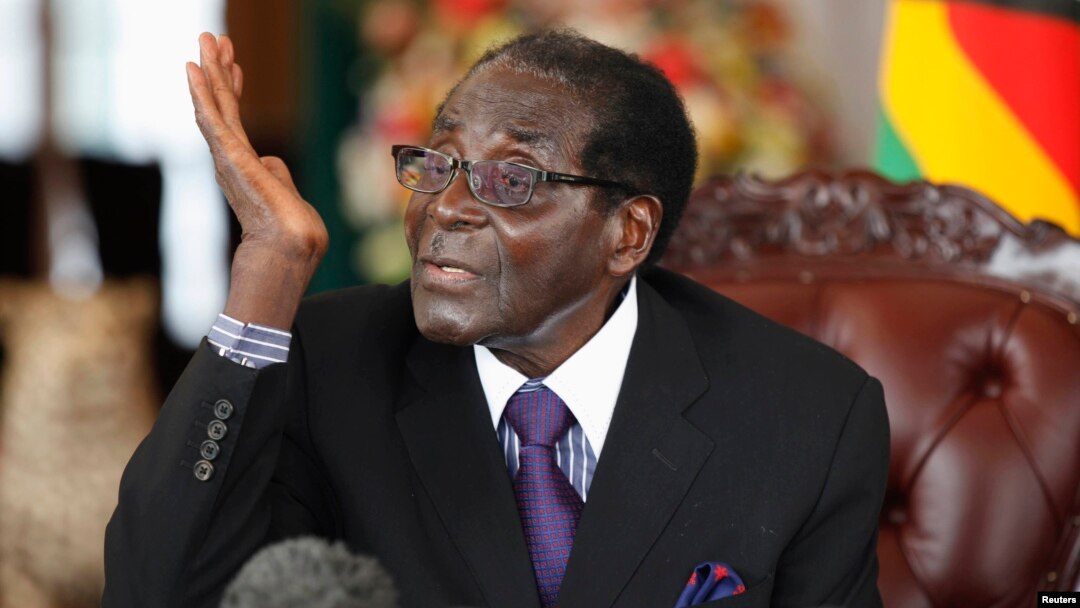HARARE —
Zimbabwe's President Robert Mugabe's new Cabinet features many familiar faces.
The longtime leader and his ZANU-PF party won easy victories in Zimbabwe's July 31 elections, and questions about the polls by observers and the opposition have been swept aside.
Analysts say the new government is stacked with Mugabe loyalists and could signal a return to hardline policies that have earned the Zimbabwean president strong criticism in the past.
Mugabe says the Cabinet is full of “young blood” but there is no one under the age of 40 in the new team and most have held positions in previous Mugabe governments.
One daily newspaper summed it up by saying, “Mugabe Recycles Old Guard.”
In remarks to his new aides, the 89-year-old president urged them to focus on Zimbabwe's economy, and to carry out his policies.
“We are trying to do our best ...We should look at our people first...People are unemployed," he said. "We have to try and correct that. The work demands that you perform. We want to see indigenization done.”
Mugabe said indigenization, a policy of seizing majority stakes of foreign-owned firms, would form the basis of Zimbabwe’s recovery, along with a focus on mining, manufacturing and agriculture. Critics of the policy said it discourages foreign investment.
Independent political and business analyst Tjenesani Ntungakwa said the Cabinet appointments suggest Mugabe plans to rule with an iron fist again.
"I see an old hardliner ZANU-PF resurfacing in the form of what has happened in the ministry of information, the likes of Jonathan Moyo for instance," he said.
In 2002 Jonathan Moyo, the country’s information minister, crafted tough media laws that resulted in a crackdown on journalists in Zimbabwe and shut down the country's independent media.
Freelance journalist Annahstancia Ndlovu said it was not the appointment of Moyo that disappointed her.
"On the issue of women, President Mugabe appointed three women in his Cabinet," she said. "As women, we feel that we did not [get a] vote. We have no representation."
On Wednesday, Mugabe said Zimbabwean women had performed badly in the July 31 elections. The president had to choose his ministers from members of parliament, which is now overwhelmingly controlled by ZANU-PF.
There are no members of the opposition Movement for Democratic Change in the Cabinet, a marked change from the past four years when the MDC and ZANU-PF shared power in a lasting, if contentious, government.
The longtime leader and his ZANU-PF party won easy victories in Zimbabwe's July 31 elections, and questions about the polls by observers and the opposition have been swept aside.
Analysts say the new government is stacked with Mugabe loyalists and could signal a return to hardline policies that have earned the Zimbabwean president strong criticism in the past.
Mugabe says the Cabinet is full of “young blood” but there is no one under the age of 40 in the new team and most have held positions in previous Mugabe governments.
One daily newspaper summed it up by saying, “Mugabe Recycles Old Guard.”
In remarks to his new aides, the 89-year-old president urged them to focus on Zimbabwe's economy, and to carry out his policies.
“We are trying to do our best ...We should look at our people first...People are unemployed," he said. "We have to try and correct that. The work demands that you perform. We want to see indigenization done.”
Mugabe said indigenization, a policy of seizing majority stakes of foreign-owned firms, would form the basis of Zimbabwe’s recovery, along with a focus on mining, manufacturing and agriculture. Critics of the policy said it discourages foreign investment.
Independent political and business analyst Tjenesani Ntungakwa said the Cabinet appointments suggest Mugabe plans to rule with an iron fist again.
"I see an old hardliner ZANU-PF resurfacing in the form of what has happened in the ministry of information, the likes of Jonathan Moyo for instance," he said.
In 2002 Jonathan Moyo, the country’s information minister, crafted tough media laws that resulted in a crackdown on journalists in Zimbabwe and shut down the country's independent media.
Freelance journalist Annahstancia Ndlovu said it was not the appointment of Moyo that disappointed her.
"On the issue of women, President Mugabe appointed three women in his Cabinet," she said. "As women, we feel that we did not [get a] vote. We have no representation."
On Wednesday, Mugabe said Zimbabwean women had performed badly in the July 31 elections. The president had to choose his ministers from members of parliament, which is now overwhelmingly controlled by ZANU-PF.
There are no members of the opposition Movement for Democratic Change in the Cabinet, a marked change from the past four years when the MDC and ZANU-PF shared power in a lasting, if contentious, government.


